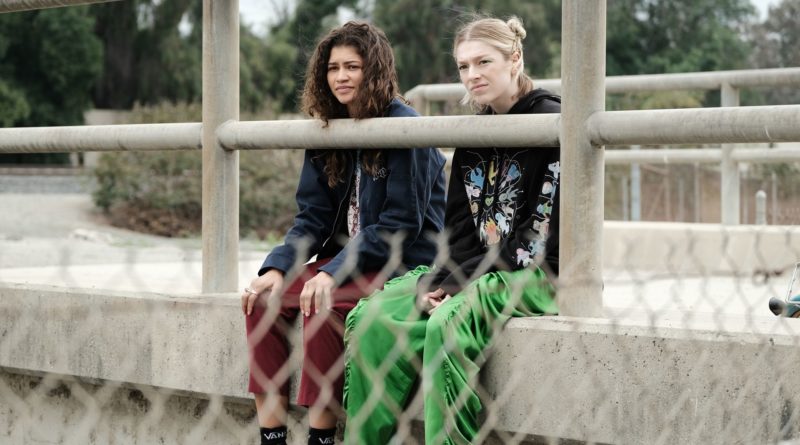In a world where online commentary can make or break something, how does Euphoria hold up?
When Euphoria first premiered on June 16, 2019, it seemed as though it were a guaranteed success. Starring the likes of A-list celebrity Zendaya and heartthrob Jacob Elordi, along with some chilling trailers, the high school drama, centered around addict Rue (Zendaya), was set to be the next big thing—and it has been.

Yet it seems general opinion surrounding the series continues to get foggier as it grows in popularity.
Today, over two and a half years since that first episode premiered, Euphoria has become HBO’s second most streamed show, just behind Game of Thrones. Considering this is an A24 production, the stunning cinematography, soundtrack, casting, and overall design come as no surprise. A24 is known for making experiences, and creator/writer Sam Levinson’s talents seem(ed?) to play right into that. Each week, tension builds during the wait for a new episode.
Season 1 averaged about 6.6 million viewers in the first 90 days following its release. The second season (which premiered nearly three years later)? An average of 16.3 million viewers.
Certainly this skyrocket in viewership is heavily influenced by TikTok, the social media platform that seems to pick and choose every trend. When everyone on TikTok starts talking about Euphoria, the people not watching want to be in on that conversation. TikTok is a community, one that’s arguably more exclusive than inclusive, so you’re probably better off knowing every trend, every song, every show, every fan theory, than you are being blissfully ignorant of them.
TikTok has created a breeding ground for millions of people to share every thought and opinion that they’ve ever had to a huge audience. Not everyone, though, is good at forming opinions—we all have our days—which makes TikTok a place where people see others’ opinions and latch onto them like a cowboy in a bullpen. Don’t let go of that bull, cowboy—you’re gonna need it when someone eventually asks you who you think the third Jacobs’ brother is.

For that reason, a lot of recent takes on the second season of Euphoria are, quite frankly, bad. The complaints are unwarranted, the fan theories are ridiculous, and it is likely a lot of those takes are coming from those same people who only started watching to be in the know. They see others’ opinions and regurgitate them into incoherent messes that often leave many viewers asking if everyone is even watching the same show.
One of the more popular—yet entirely insane—fan theories is that Ashtray, a middle school-aged boy who was raised as main character Fez’s younger brother, is the third child in the powerful, terrifying Jacobs family. Not only is Ashtray significantly too young to be the third Jacobs brother, all of whom are shown in a family portrait, but he is a different race and his storyline explicitly shows him being left with Fez’s family as a baby, not as a young child. Yet many TikTok commenters were absolutely set on the idea that they had cracked some difficult code and solved the puzzle of Euphoria, their comments gaining thousands of likes from like-minded viewers.
There are plenty of other bad takes and theories—Jules is a flat character, Nate was assaulted by his father, the list goes on- all of which can be countered by actually watching the show and paying attention. There isn’t very much of that from the people of TikTok.
What’s interesting, however, is that their big claims about the show are often some of the most well-circulated, rather than other concrete, arguable points:
Sam Levinson completely changed all the characters.
What happened to that plotline from season one?
Where did this character go?
Why is Ethan (Austin Abrams) suddenly my favorite person, and how do I go about creating a petition for the show to be solely about him?

These are all, of course, valid observations (especially the last one!). It does seem that, in many ways, Euphoria has taken some turns, possibly for the worst. Some characters are totally different than they were a season ago, and storylines that were meant to be continued disappeared with no pickup in sight. McKay (Chris Algee) was a prominent character in season one; but when Algee quit the show between seasons, multiple storylines had to be changed. Barbie Ferreira’s character Kat has also been one whose arc suddenly seems wobbly and poorly written in season two, and amid rumors that Ferreira and Levinson had it out on set, this is not too shocking.
So Euphoria viewers, both the ones with and without a brain, have come to the conclusion that the show is worth watching, worth keeping up with to be in “the know”, but definitely has gone downhill in some respects. So, then, what exactly is it that makes Euphoria worth it?
For one, the cinematography; you just don’t get visuals, lighting, and editing like this in your normal high school drama. Euphoria-themed parties have become common among young people, who adhere to the aesthetic of the show in their dress and decor. The suspense of waiting a week between episodes adds to the appeal as well. The rise of streaming platforms over the last few years has made the norm for seasons to be released all in one day, and, typically, watched in one day, too.
The acting makes this list, too. Even when there are arguments about some dialogue being corny (or the almost impressive amount of cursing), there seems to be a general consensus that the actors are doing what they can, and what they can do is outstanding.

And the least debated of all—the score. Composed and performed by Labrinth, the Euphoria score is haunting, angelic, and cinematic. Each character’s theme embodies them perfectly (will any of us ever not hear “Nate Growing Up” at the sight of Jacob Elordi now?), as though it were Labrinth writing the show and not Levinson. Unless it is being praised, Labrinth’s work is not a topic of conversation within the cesspools of TikTok Euphoria discourse.
This is a culture dominated by online opinion, and it seems, given its target demographic, that the fate of Euphoria lies somewhat in the hands of a generation who have infinite ways to spread their thoughts in a matter of seconds. For now, though, it is likely Euphoria will survive the riveting discussion on TikTok and be kept alive by its strengths, which, arguably, outweigh its weaknesses. The geniuses of TikTok will continue to watch with one eye shut, scrolling absently on their phone waiting for the episode to be over so they can see what everyone else has to say.
No piece of art is perfect, especially not under the scrutinizing eyes of millions of people. We are all better off, maybe, to enjoy it for what it is, faults and all. All publicity is good publicity, and perhaps this too is true for reviews, regardless of their nature. Euphoria will surely only grow even more from here.

